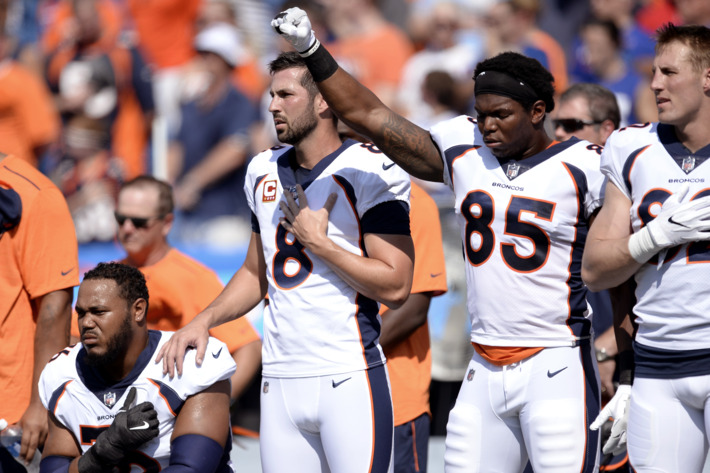
Sports fans have always cheered and supported athletes at any level. The sports fans enjoy being entertained by watching athletes engage in competition. When sports fans are viewing a sporting event either in person or on television, they have an opportunity to disengage for three to four hours from what is occurring in their life or in the politically-charged world. Currently, sports fans are being challenged by the athletes’ socio-political protests during the presentation of the National Anthem. Athletes’ polarizing actions have reduced the enjoyment of the sporting event for the average fan.
Most American sports fans understand that free speech is protected under the First Amendment of the United States Constitution. They have witnessed protests from athletes at a variety of sporting events and over the course of many years. Perhaps, the most iconic protest by an athlete occurred during the medal ceremony of the 1968 Summer Olympics when teammates Tommie Smith and John Carlos, members of the United States men’s track team, raised their fists in support of Black Power. The duo claimed that they were protesting against social injustice, racism and discrimination. Soon professional athletes began raising protests regarding various other social issues targeted the playing of the National Anthem. In 1995, Mahmoud Abdul-Rauf, an NBA player, refused to stand for the National Anthem because he believed the American Flag was a symbol of racism and of oppression. Recently, Colin Kaepernick, started to kneel before the National Anthem presentation to address police brutality against African-Americans. Other professional athletes, either in support of Kaepernick or the cause against police brutality, also knelt during the playing of the National Anthem.
On September 24, 2017, President Trump criticized those NFL players who were not standing for the National Anthem. In an immediate response, a tidal wave of athletes, from the professional, intercollegiate, and high school level protested the National Anthem. Their forms of protest included taking a knee, raising their fist, displaying a t-shirt with a protest message, and to even staying in the locker room during the playing of the anthem. The anthem had become a platform for the athletes’ grievances. Their reasons for protesting have expanded and included a variety of causes ranging from police brutality, social injustice, racism, and to not supporting the 45th President of the United States.
The playing of the National Anthem is no longer a moment of deference to those, past and present, who have defended the country, to honor the nation, or to even unite as sport’s enthusiasts. Unfortunately the “moment” is now focused on the athlete identifying their social causes. The athletes’ ideological-driven actions confront the fans with their political agenda. It is the protest that has become the focus instead of the sporting event. ESPN shows footage of those who are protesting and reports the number of players kneeling. The sports fans simply want to watch the competition devoid of any political theater.
By Dr. Matthew Williams
Dr. Matthew Williams is an Associate Professor of Sport Management at The University of Virginia’s College at Wise and is an avid NASCAR fan.